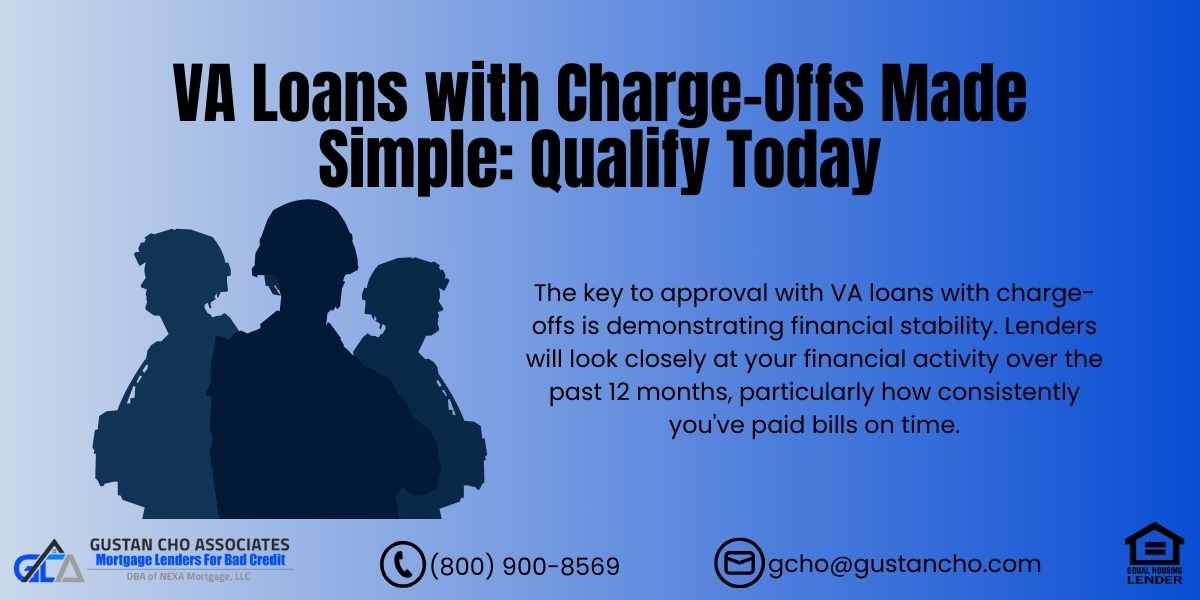VA Loans with Charge-Offs Made Simple: Qualify Today
VA Loans with Charge-Offs: How Veterans Can Still Qualify in 2025
Are you a veteran or active-duty service member worried that charge-offs on your credit history could prevent you from getting a VA loan? You’re not alone. Many borrowers wonder if it’s possible to secure VA loans with charge-offs. Fortunately, there’s good news: you can still qualify and become a homeowner even if your credit history has blemishes. This guide will help you understand how to get approved for VA loans with charge-offs in 2025.
What is a Charge-Off, and How Does it Affect VA Loans?
A charge-off occurs when you haven’t paid a debt for at least six months, causing the lender to write it off as a loss. However, this doesn’t erase your responsibility to pay back the debt. Charge-offs negatively impact your credit score and remain on your report for seven years, signaling to future lenders that you’ve had trouble repaying debts in the past.
But here’s the good news: the presence of charge-offs doesn’t automatically disqualify you from getting a VA loan. VA loans offer flexible guidelines, making VA loans with charge-offs possible.
VA Loan is the Perfect Choice for Veterans with Charge-Offs
Apply Now And Get 100% financing, even with less-than-perfect credit. Keep more cash in your pocket
Can You Get VA Loans with Charge-Offs?
Yes! The Department of Veterans Affairs (VA) doesn’t impose a strict minimum credit score. However, most mortgage lenders set their own criteria. Lenders generally require a credit score of about 580 or more, although it is possible to qualify with lower scores through manual underwriting.
The key to approval with VA loans with charge-offs is demonstrating financial stability. Lenders will look closely at your financial activity over the past 12 months, particularly how consistently you’ve paid bills on time.
Understanding VA loan eligibility
First, VA loans are a mortgage program for veterans, active-duty military members, and eligible surviving military spouses. Private lenders, banks, and mortgage companies provide the loans. Still, they are guaranteed or insured by the Department of Veteran Affairs (VA) and offer favorable terms and benefits to the borrowers. Here are the key requirements for obtaining a VA loan
- Eligible borrowers – not everybody is eligible for this loan. Only veterans who were honorably discharged, active-duty service members with at least 90 consecutive days in the service, National Guard members with at least 90 days of active duty, and reserve members with the same period of active duty. It is also available for surviving military spouses.
- Certificate of Eligibility – to prove eligibility for a VA loan, borrowers need to obtain a Certificate of Eligibility (COE) from the VA, verifying their military service or surviving spouse status. It can be obtained through the VA directly or with the assistance of a VA-approved lender.
- Property Eligibility – VA loans can purchase various properties, including single-family homes, condominiums, and multi-unit properties (up to four units). The financed property must be intended for the borrower’s primary residence.
- Credit and income requirements – even though the VA doesn’t set a minimum credit score requirement, VA lenders do. For this reason, the credit score requirements vary by lender, with most requiring a score of 620 and above to obtain financing. In addition to the credit score, the VA requires borrowers to maintain a certain amount of income every month after paying all their bills. This is what is referred to as residual income. These requirements increase the chances of borrowers meeting their financial obligations, which, in turn, reduces your chances of default.
- Funding fee – VA loans typically require a funding fee, which helps sustain the VA loan program. The fee varies based on factors such as the borrower’s military category, the down payment amount (if applicable), and whether it is the borrower’s first or subsequent VA loan.
Please remember that while the VA guarantees a portion of the loan, private lenders still provide VA loans. Therefore, meeting the eligibility requirements does not automatically guarantee approval, as lenders may have additional criteria and underwriting standards.
Manual vs. Automated Underwriting for VA Loans

Automated underwriting relies on computer algorithms to approve loans, usually requiring a cleaner credit history. However, manual underwriting involves human review, considering your entire financial story. Manual underwriting can be your best route to approval if you have charge-offs.
For manual underwriting, you’ll typically need:
- 12 months of on-time payment history
- Explanation letters for your charge-offs
- Evidence showing improvement in your financial situation
- Stable income and employment
Competitive, Low Interest Rates
VA Loans offer veterans exclusive access to lower rates, saving you money each month
Steps to Qualify for VA Loans with Charge-Offs
Follow these proven steps to improve your chances of approval:
1. Check Your Credit Report
It is very important to look at your credit reports from the three big companies: Equifax, Experian, and TransUnion. This is where they keep all the information about your credit history. When you check your reports, you want to look carefully for any mistakes. Sometimes, there can be errors that can hurt your score.
If you find any wrong information, make sure to dispute those errors right away. Fixing errors can significantly enhance your credit score. This is especially important if you are considering getting VA loans with charge-offs. A better credit score can give you a better chance of getting the loan you need.
2. Establish a Positive Payment History
Before applying, make timely payments on your current bills, especially in the last 12 months. Even one year of consistent payments can greatly improve your chances of getting approved.
3. Consider Settling or Paying Off Charge-Offs
Although paying charge-offs isn’t always required, settling your debts shows lenders you’re serious about your financial responsibilities. Negotiating settlements can also help your overall financial health.
4. Build New Credit Wisely
Open a secured credit card or small installment loan to build positive credit. Use less than 30% of your credit limit and pay balances off monthly to maximize credit score improvement.
5. Maintain a Stable Income and Employment
When you want VA loans with charge-offs, showing you have a steady job is important. Lenders like to see that you earn money regularly. Having enough money left after paying your bills—this is called residual income—is also very important. It shows that you can manage your money well. If you prove you have a stable job and enough leftover cash each month, it can help you get the loan you need. Stability makes it easier for lenders to say yes.
6. Write a Letter of Explanation
Draft a clear letter explaining what caused the charge-offs and outline your steps to improve your finances. Being transparent helps lenders see beyond your past mistakes.
7. Work with Experienced Mortgage Lenders for Bad Credit
Seek lenders who specialize in VA loans with charge-offs. Experienced professionals, like Mortgage Lenders for Bad Credit, understand your situation better and can guide you toward the best options.
Real-Life Success Story: VA Loans with Charge-Offs
Look at James, a Navy veteran with several charge-offs from a tough financial period. By following the steps mentioned above—mainly manual underwriting and providing a detailed letter of explanation—he successfully purchased a home in Florida in 2024. James secured a favorable interest rate and terms despite his initial setbacks due to his consistent payments over the last 12 months.
How Soon After a Charge-Off Can You Qualify?
When it comes to VA loans with charge-offs, you can qualify for a loan soon after a charge-off happens. If you have a stable financial history after the charge-off, lenders may look at your application. It is a good idea to show that you’ve been making on-time payments for at least 12 months since the charge-off.
The longer you can prove that you are handling money responsibly, the better your chances of getting approved.
Managing your finances well makes your application stronger. Lenders want to know that you have learned from past mistakes and can be a reliable borrower. If you keep up with your payments and avoid new issues, you can improve your chances of getting VA loans with charge-offs. Remember, a positive financial record makes a big difference!
Real-Life Tips for Success
- Budget Wisely: Make a realistic budget and stick to it. This will help you manage your debts and avoid new problems.
- Save for Emergency Funds: A financial safety net demonstrates stability and reduces risk in lenders’ eyes.
- Keep Debt Levels Low: Minimize your debt-to-income (DTI) ratio by reducing unnecessary expenses.
When to Consult a Credit Counselor
If you’re struggling with debts, especially VA loans with charge-offs, it might be time to talk to a credit counselor. A trustworthy credit counseling agency can help you create a strategy that aligns with your requirements. They can give you tips, talk to creditors, and help you get back on track with your money. Just make sure to be careful and pick a reliable company. Look for counselors approved by groups like the NFCC so you know you’re getting good help.
VA Loans vs. FHA and Conventional Loans
When comparing different types of home loans, it’s important to understand how VA loans with charge-offs work. VA loans are special loans backed by the government, which means they can be more flexible than other loans like FHA or conventional loans.
For example, if you have charge-offs on your credit report, VA loans usually let you handle them differently. Unlike FHA loans, which often require paying off these charge-offs before you can get a loan, VA loans look more closely at how you have been paying your bills recently. This means that even if you have some older charge-offs, your recent good payment history can still help you qualify for a VA loan.
Overall, if you are considering a home loan and have charge-offs, VA loans might be a good option because they understand that everyone has different financial situations.
Apply for VA Loans with Confidence
If you’re a veteran with charge-offs, homeownership is still within reach. With the right preparation and professional support, you can overcome past credit issues and successfully secure a VA loan.
Ready to Get Approved for VA Loans with Charge-Offs?
At Mortgage Lenders for Bad Credit, we specialize in guiding veterans and service members through securing VA loans, even with charge-offs. Don’t let past credit challenges stop you from becoming a homeowner in 2025.
Get pre-approved today and take the first step towards your new home! Call or text us at 800-900-8569 or email gcho@gustancho.com.
Unlike FHA or conventional loans, VA loans don’t require monthly mortgage insurance payments
Apply Now And Get recommendations From Loan Experts
Frequently Asked Questions About VA Loans with Charge-Offs:
Q: Can I still get VA loans with charge-offs?
A: Yes! Having charge-offs doesn’t automatically stop you from getting VA loans with charge-offs. You can still qualify with a stable financial history.
Q: What exactly is a charge-off?
A: A charge-off happens when you don’t pay a debt for six months. The lender writes it off as a loss, but you still owe the money.
Q: How long do charge-offs stay on my credit report?
A: Charge-offs remain on your credit report for seven years; however, you can still be eligible for VA loans even if they have not yet been deleted.
Q: Do I have to pay off charge-offs before applying for a VA loan?
A: Not always. Some lenders don’t require paying them off, but paying or settling them can make getting VA loans with charge-offs easier.
Q: What’s manual underwriting, and how does it help?
A: Manual underwriting involves a human underwriter reviewing your loan application rather than relying solely on automated systems. It assists borrowers in securing VA loans with charge-offs by considering their recent positive financial behavior.
Q: What credit score do I need for VA loans with charge-offs?
A: Most lenders require around 580 or higher, but even lower scores might qualify through manual underwriting.
Q: Can writing a letter explaining my charge-offs help me get approved?
A: Yes, a clear letter explaining your situation and the improvements you’ve made can greatly help you get approved for VA loans with charge-offs.
Q: Should I talk to a credit counselor if I have charge-offs?
A: Consulting a credit counselor can help you manage your debts better, especially if you’re applying for VA loans with charge-offs.
Q: What’s the difference between VA and FHA loans with charge-offs?
A: VA loans are usually more flexible than FHA loans. FHA loans often require paying off charge-offs first, while VA loans mainly look at your recent payment history.
Q: Where can I find mortgage lenders who handle VA loans with charge-offs?
A: Find lenders that help people with bad credit or offer VA loans, like Mortgage Lenders for Bad Credit, to get support and approval that suits your needs.
This blog about “VA Loans with Charge-Offs Made Simple: Qualify Today” was updated on March 14th, 2025.
First-Time Homebuyers & Experienced Buyers
Apply Now And Get recommendations From Loan Experts







